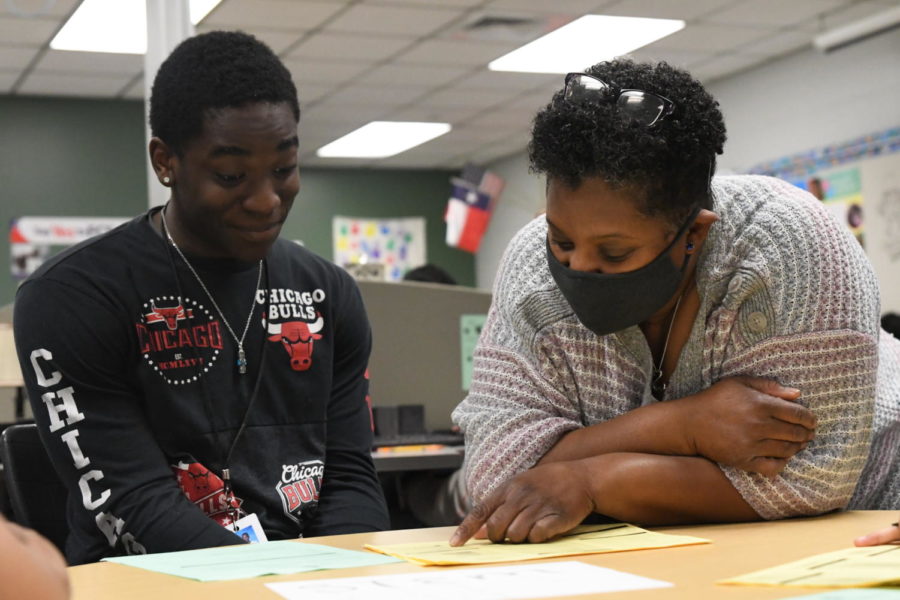Counselors, teachers work to put students on right path
Isaiah Junior, 10, works on his course selection paperwork with teacher Rolanda Wilkins during Intro to Culinary Arts on Jan. 10. Teachers met with students individually to help them select courses for the upcoming school year.
When counselor Gina Sanchez was in high school, her counselor didn’t do half the things she does for the students. His lack of help and support bothered Sanchez, and made her doubt her chances of getting the scholarships she wanted.
“That is part of the reason that I’m a counselor,” Sanchez said. “My high school counselor did not do anything for me.”
Sanchez is determined to be different, making kids aware of just how much help they can get before they graduate. She emphasizes the importance of being open-minded to different classes and ideas.
“Don’t put all your eggs in one basket,” Sanchez said. “You know, things happen in life so you have to have a backup.”
Counselors and teachers work to make students aware of all the opportunities, especially on Course Selection Day. The day is held each January to allow students to discuss with their teachers what class best fits them for the next school year.
Oftentimes, it helps introduce opportunities like career certificates in the CTE (Career and Technical Education) department that students are otherwise unaware of.
Teacher Alyssa Grant, who attended Kingwood Park as a high schooler, wishes students took more advantage of elective classes that can help, especially when they’re trying to decide what to do as an adult.
“Try to talk to some of the career teachers, like the elective teachers, and see if there’s any interest there,” Grant said. “Talk to counselors again, just to find out what classes are offered if you don’t know what you want to do.”
CTE classes are not only the ones teaching key skills. Other electives target important skills, as well as clubs, organizations and sports teams.
“We do a lot of things that I don’t think students understand that we do,” Sanchez said. “They’re called soft skills. So it’s like how to be a team player, how to talk to people, how to have better communications, how to balance life. Important things like being able to communicate what you want properly, not only through writing.”
According to many of the students and teachers, the most important of these soft skills is time management.
“Time management is the biggest thing,” chemistry teacher Meredith Schlosberg said. “Make sure that you set a schedule for yourself so that you can get everything done that you need to get done.”
According to Sanchez, it’s still critical for kids to note there is only so much teachers and counselors can do for a student in four years.
“I think that we can only be the guide,” Sanchez said. “Like, we can hold your hand, and we can take you to the finish line. But I think parents have to help you along the way.”
Your donation will support the student journalists of Kingwood Park High School. Your contribution will allow us to purchase equipment and cover our annual website hosting costs. The journalism program at Kingwood Park is funded solely from student sold advertisements and community support.



Marty • Jan 13, 2022 at 9:20 pm
Counselor Sanchez sounds like one amazing person. Your a writer Ana….its good to find one’s purpose early in life. Very proud ?
Amnelis Grillo • Jan 12, 2022 at 2:35 pm
I am proud of being your mother. Thank you for being such an amazing person, big sister, friend and daughter. Love you Ana!! Nice WORK ?
Melvin • Jan 12, 2022 at 7:53 pm
I’m very happy to see you did such a great job with this report and it’s just the beginning of your success , very detail information base on your knowledge, keep up the great work and God will direct you through life til you find your purpose you were born to do, I feel in reading your report , let me know you are on your way to greatness . Stay focus and stay tuned to your mother support , she know you first and best .?